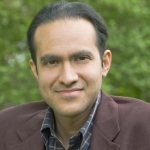 (HOST) Commentator and UVM Professor Saleem Ali has been shocked by recent criticism of a notable philanthropist operating in his country of origin.
(HOST) Commentator and UVM Professor Saleem Ali has been shocked by recent criticism of a notable philanthropist operating in his country of origin.
(ALI) As a Pakistani-American, I try to follow the work of American philanthropists on the ground whenever I am back in the region. In recent years I have tried to follow some of the work of mountaineer Greg Mortenson, whose book "Three Cups of Tea" has become a media sensation. So I wasn’t altogether surprised this week, when an exhaustive journalistic investigation by CBS News suggested that the Western obsession with one man and his organization in solving the intractable problems of Pakistan and Afghanistan may have been misplaced at best.
60 Minutes challenged a range of stories in Mortenson’s books, most notably his claim to have been kidnapped by the Taliban. For example, a photograph in his second book supposedly showing Taliban captors whom he claimed to have "befriended" is actually of Wazir tribesmen who had been his hosts and escorts – including a well-respected research analyst who has even authored reports for the New America Foundation.
But whatever the outcome of this current controversy, it is troubling to realize that scandals like this suggest a dangerous conflation of pomp and circumstance with philanthropy. Often the easiest way to secure funds from the public is through theatrical melodrama rather than simple honest hard work. There is tremendous insularity within the circuits of philanthropy where initial success of a book or a film can propel an individual to fame crowding out far stronger but comparatively silent players. The networks of the elite philanthropic glitterati from Bill Gates to Bill Clinton to Bono are hard to penetrate but once you are able to get through – usually through a carefully orchestrated media campaign – meteoric rise is assured.
Such sudden fame is seductive and propels the ego of the philanthropist beyond reasonable proportion. Perhaps this is the case with Mr. Mortenson, who probably began his work with noble intentions.
No doubt some good may have come from the $60 million dollars which have been lavished on him by honest book buyers and donors but when funds for good causes are so hard to come by, the mere thought that only about 30% of these funds may have actually reached those in need is shocking and sad. The philanthropist has a duty and accountability to his donors which is far greater than any other occupation because there is a social contract of human trust at play. Philanthropy must be decoupled from celebrity. With the help of responsible media organizations the public will need to be far more discerning about such matters. It is also to be hoped that Mortenson and other celebrity philanthropists like him, learn to sip their tea with a healthy serving of humble pie.